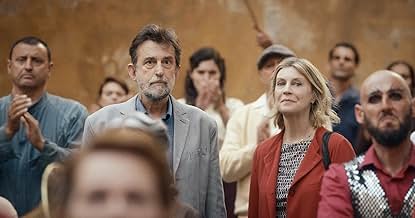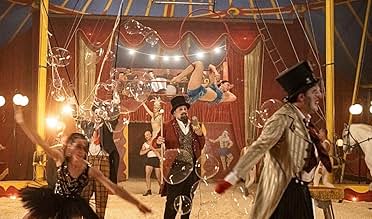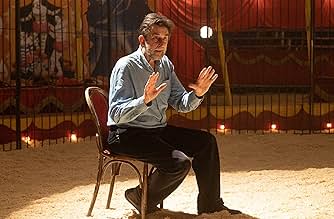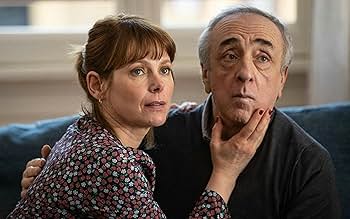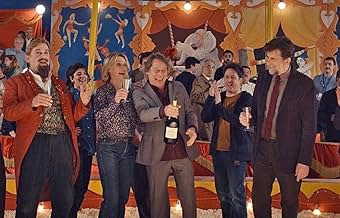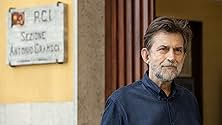NOTE IMDb
6,7/10
3,8 k
MA NOTE
Dans un contexte de mille incertitudes, Giovanni réalise un film sur la vie d'un intellectuel communiste en 1956, date fatale de l'invasion de la Hongrie par l'Union soviétique. Pendant ce t... Tout lireDans un contexte de mille incertitudes, Giovanni réalise un film sur la vie d'un intellectuel communiste en 1956, date fatale de l'invasion de la Hongrie par l'Union soviétique. Pendant ce temps, son mariage traverse une crise.Dans un contexte de mille incertitudes, Giovanni réalise un film sur la vie d'un intellectuel communiste en 1956, date fatale de l'invasion de la Hongrie par l'Union soviétique. Pendant ce temps, son mariage traverse une crise.
- Réalisation
- Scénario
- Casting principal
- Récompenses
- 2 victoires et 21 nominations au total
Avis à la une
On the occasion of his 70th birthday, Director Moretti sends a heartfelt love letter to his fans, reliving the themes that made him popular and acclaimed over the course of 50 years. The story jumps between three distinct layers: Moretti's own life, the movie he is shooting, and the movie he is about to make, with each providing its own share of humorous moments, successes, and of course, failures (due to Moretti's intrinsically pessimistic outlook). Compiled from both his own works and the works of those who have inspired him, particularly Federico Fellini, the movie is ultimately an observation of the passage of time, with a faint but lasting hope of a future. When you let it be.
I didn't like this movie at all. Perhaps this was a movie for die hard Moretti fans that saw all his movies? For me the story was very weak, the pace was utterly slow and clearly they should prohibit certain directors to act in their own movies. There were some nice shots and sure I could smile a few times. I guess a metafilm can work, but I couldn't relate to neither one of the stories and both of the stories were quite superficial and unexciting. In short: I agree with the reviewer of the gardian who writes: "I'm sure the future will be brightened by another, better Moretti film - this one is best forgotten."
#Cannes2023# A film by a white old male director that far exceeded my expectations. It can be considered as a self-reflection and self-deprecating work from the usually narcissistic Moretti. He directed and acted in a movie that explores his journey from denial to ultimately admitting his creative decline, the irrelevance of his themes (at least to a diminishing audience), his inability to work without his wife "assistant" and the growing resentment from his crew towards his mansplaining . In the end, he also concludes with a false sense of hope, summarizing it as a lament for the leftist movements of the 1950s and acknowledging his inability to find a good ending. This self-analysis and sincere display of vulnerability moved me. There are countless directors in their old ages who have run out of creative juices, but not many can be this candid. Additionally, there are Fellini-esque elements throughout the film, with circus motifs and ensemble dancing, adding a touch of delightful nostalgia. @ Cannes Cineum Aurore.
Nanni Moretti creates a game of interpretations of himself by building a double vision of satire such as split screen, one with his narrator's voice, and in the other criticisms, ironies, melancholies, professional successes and private failures. A film within a film from the '50s to bear witness to the decadence of politics, while Giovanni mismanages his marriage, jeopardizing the film produced by his wife Paola. Everything is resolved with red flags in a parade with famous actors, Jasmine Trinca to with Renato Carpentieri during the march in a revival of the ideologies of the time. Maria Pia.
In "The Sun of the Future," Nanni Moretti reinvents himself as a consummate filmmaker, expressing his views on the political world, streaming platforms, contemporary cinema, his personal life, and his relationship with his partner more forcefully than ever before. This astonishing Italian comedy delves into the critique of all these aspects through the film that the main character (played by Moretti) is filming.
Compared to "Dear Diary" (1993), which was more personal and, if I may say so, somewhat egocentric, "The Sun of the Future" stands out for being exceptionally political and romantic. This film perfects the autobiographical approach the director explored in his previous work.
The film serves as a starting point for an important debate about independent cinema and the strategies it must employ to survive in the streaming era. Moretti criticizes the current trend in which movies are expected to lay out their entire plot within the first two minutes, an illogical formula in his perspective and characteristic of the senseless surge of streaming in recent years.
Ultimately, "The Sun of the Future" is a work imbued with an underlying sentiment: love. Love is the driving force and the brake in the entire narrative, a crucial element that can change things for better or for worse.
Compared to "Dear Diary" (1993), which was more personal and, if I may say so, somewhat egocentric, "The Sun of the Future" stands out for being exceptionally political and romantic. This film perfects the autobiographical approach the director explored in his previous work.
The film serves as a starting point for an important debate about independent cinema and the strategies it must employ to survive in the streaming era. Moretti criticizes the current trend in which movies are expected to lay out their entire plot within the first two minutes, an illogical formula in his perspective and characteristic of the senseless surge of streaming in recent years.
Ultimately, "The Sun of the Future" is a work imbued with an underlying sentiment: love. Love is the driving force and the brake in the entire narrative, a crucial element that can change things for better or for worse.
Le saviez-vous
- AnecdotesSelected to compete for the Palme d'or in the 2023 Cannes Film Festival. This is the ninth time that a film from director Nanni Moretti is selected at Cannes; every movie he made since "Caro diario" has been at Cannes, he even won the Palme d'or in 2001 with "The Son's Room."
- ConnexionsFeatures La dolce vita (1960)
Meilleurs choix
Connectez-vous pour évaluer et suivre la liste de favoris afin de recevoir des recommandations personnalisées
- How long is A Brighter Tomorrow?Alimenté par Alexa
Détails
- Date de sortie
- Pays d’origine
- Langues
- Aussi connu sous le nom de
- A Brighter Tomorrow
- Lieux de tournage
- Sociétés de production
- Voir plus de crédits d'entreprise sur IMDbPro
Box-office
- Budget
- 12 284 110 € (estimé)
- Montant brut mondial
- 6 668 544 $US
- Durée1 heure 35 minutes
- Couleur
- Rapport de forme
- 1.85 : 1
Contribuer à cette page
Suggérer une modification ou ajouter du contenu manquant

![Regarder Trailer [OV]](https://m.media-amazon.com/images/M/MV5BZjUxOGY3NjUtN2RiNy00NDlkLWE4MGYtZjkxMTU2MmNmOTBmXkEyXkFqcGdeQXRyYW5zY29kZS13b3JrZmxvdw@@._V1_QL75_UX500_CR0)

